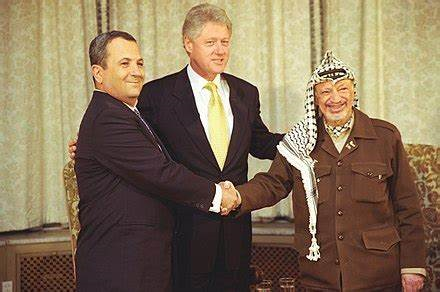
source: Wikipedia Camp David Summit
July 11-25, 2000 – Camp David Summit: Many ideas and proposals were discussed at Camp David, most of which were presented orally rather than in written form. Israel indicated a willingness to relinquish control over some areas of Jerusalem and the Old City. According to various sources, Israeli proposals included annexing between 8% and 13% of the West Bank, along with unspecified land swaps.
The Palestinian proposal, by contrast, allowed for 2.5-3% annexation with a land swap of equal size. The Palestinian side also insisted on a “Right of Return” for refugees, albeit with certain limitations. This issue of the “Right of Return” emerged as the central obstacle in the negotiations.
Dennis Ross later suggested that the main reason for the summit’s failure was Yasser Arafat’s unwillingness to commit to a final deal with Israel that would relinquish any of the Palestinians’ maximal demands, especially the right of return. Ross claimed that Arafat’s true goal was not a two-state solution with independent, neighboring Israeli and Palestinian states but rather a single Arab state covering all of historic Palestine.
28.9.2000 – Second Intifada begins after A. Sharon visit to Temple Mount
14.10.2000 – 2000 Ramallah lynching – Wikipedia

List of Palestinian suicide attacks – Wikipedia
19-23.12.2000 – “Clinton Perimeters”: Clinton proposed 94-96% of the West Bank and entire Gaza Strip plus 1-3% land swap to partially compensate for the annexations. The Palestinian state would have to be contiguous, and annexed areas along with the number of Palestinians affected would be as minimized as possible.
Gave sovereignty to Palestinians over Temple Mount, divided Old City and East Jerusalem.
Both sides accepted the plan with reservations.
Barak send 20-page letter of “reservation” with the two main points: he would not sign any document that transfers sovereignty on the Temple Mount to the Palestinians, and that “no Israeli prime minister will accept even one refugee on the basis of the right of return.”
Palestinians claimed “that the proposals in general are too vague and unclear to form an acceptable framework for an agreement“ (mainly about annexation/swap etc.) but Clinton Perimeter is just a framework proposal. The details could be negotiated later.
21-27.1.2001 – Taba Summit
27.1.2001 – Ehud Barak declares: “There is no partner for peace”
Summary
You could say that Israel blaming the Palestinian side is biased, and the same applies in reverse. Even the supposedly neutral perspective of Clinton and his team could be seen as biased. Similarly, when Nabil Amr claims that Arafat caused the Camp David talks to fail, that may also have political motivations. We could debate endlessly over which specific issues or actions led to the breakdown of negotiations, but two facts are crystal clear:
- It was the Israeli government that chose to end the conflict back in 1993, taking incredibly high risks—so high that many saw it as almost reckless. No one would take such risks without genuinely seeking peace and a two-state solution.
- On September 28, 2000, a wave of Palestinian violence broke out across the region. Violence, under any circumstances, only leads to more violence. Starting violence in the midst of ongoing negotiations can only be seen as an intent to end the peace process.
Additional resources:

